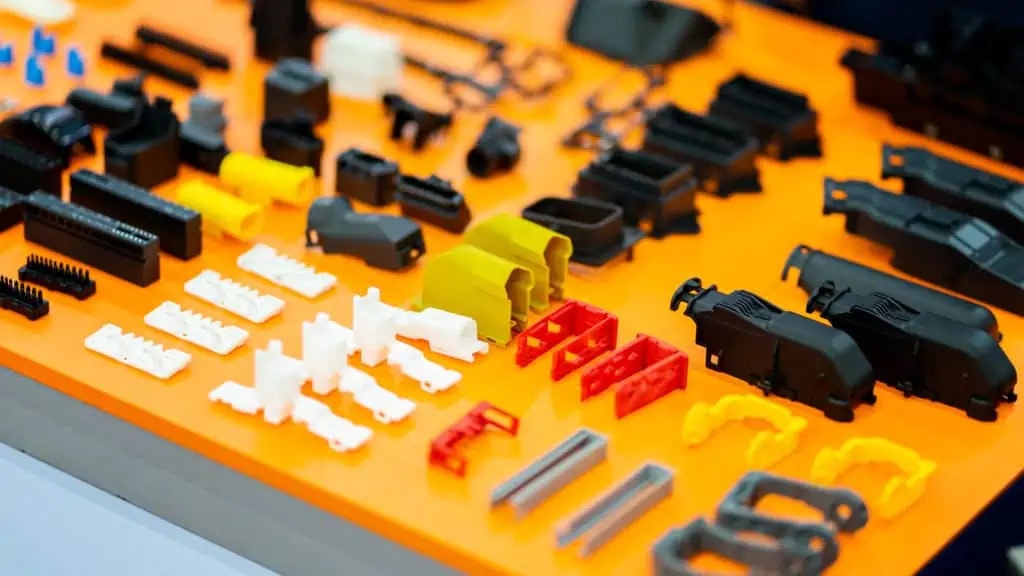ABS Injection Molding
Plastic injection molding is a manufacturing process that injects melted plastic using high pressure into a pre-shaped mold to create products with particular specifications. Lerner Molded Plastics provides injection molding design services for ABS injection molding projects. We have over 35 years of experience designing injection molds and a cutting-edge injection molding facility. Here you can learn more about ABS injection molding and its benefits, applications, and considerations.
What Is ABS Injection Molding?
ABS refers to acrylonitrile butadiene styrene, a thermoplastic polymer commonly used for injection molding. The primary ingredients of acrylonitrile, butadiene, and styrene each impart specific properties to ABS injection molded parts. Acrylonitrile adds hardness and provides heat and chemical resistance. Butadiene offers added toughness and impact resistance. Styrene adds strength, gloss, and workability.
In ABS injection molding, ABS plastic pellets are melted and injected into the cavity of a two-part mold that forms a single part. As soon as the mold is filled, the plastic will solidify and cool into the shape of the mold.
ABS Plastic Injection Molding Benefits and Applications
ABS plastic injection molding has multiple benefits and applications. Since injection molding is so versatile, it is a preferred method for rapid part manufacturing. The main benefits include:
- Complex geometry: The high pressure and heat of the injection molding process press the ABS closer against the mold, which enables mold designers to impart highly complex geometries and nuanced details onto the final products.
- Efficiency: Once presses are pre-programmed and molds are designed to custom specifications, the injection molding process is fast. Manufacturers can produce many parts from a single mold, increasing efficiency, and throughput.
- Strength: Using fillers in injection molds reduces the density of the final part, which increases its strength and durability.
- Material variety: Injection molding enables co-injection molding, which means you can use different types of plastic at once.
- Automation: Plastic injection molding is an automated process that can be controlled by a single operator. This means reduced manufacturing and labor costs, leading to more competitive prices for customers. Automation eliminates human error and ensures that the injection molded parts are precise and accurate.
Industries that rely on ABS injection molding include:
- Automotive
- Appliance
- Consumer goods
- Electronics
- Recreation
- Sports
ABS Injection Molding Properties and Considerations
To prevent part defects, consider the mold shrinkage (0.004 to 0.007 inches) and water absorption (0.16% to 0.25%) of ABS. These properties affect curing and processing. Other properties to consider when ABS molding are:
- Temperature control: Operators must make sure not to overheat ABS, which can break down chemically under too much heat.
- Absorption value: ABS has a moisture absorption rate of 0.2 – 0.8%.
- Injection pressure: ABS requires higher injection pressures, but too much pressure can cause excess friction and make it difficult to remove the part from the mold without damaging the part surface.
- Viscosity: Viscosity is the measure of a fluid’s resistance to deformation. Melting temperature influences ABS’s viscosity—too much viscosity makes the material too difficult to mold, but too little viscosity can produce imprecise results.
- Injection speed: ABS must be injected at the right speed. If it’s too fast, the plastic can burn or decompose. If it’s too slow, it may not properly fill the mold.
ABS Injection Molding From Lerner Molded Plastics
Lerner Molded Plastics is an ISO-certified plastic molding manufacturer that can create high-quality design and tooling solutions for your project. Our custom and offshore injection molding capabilities enable us to meet small, intricate, multi-cavity, or large component specifications. We aim to ensure repeatable, reliable solutions for your applications, and we meet this challenge by adhering to the strictest industry standards.
To learn more about plastic injection molding, visit our blog. To browse our services, check out our services page. If you’re ready to begin your custom project, request a quote today.

